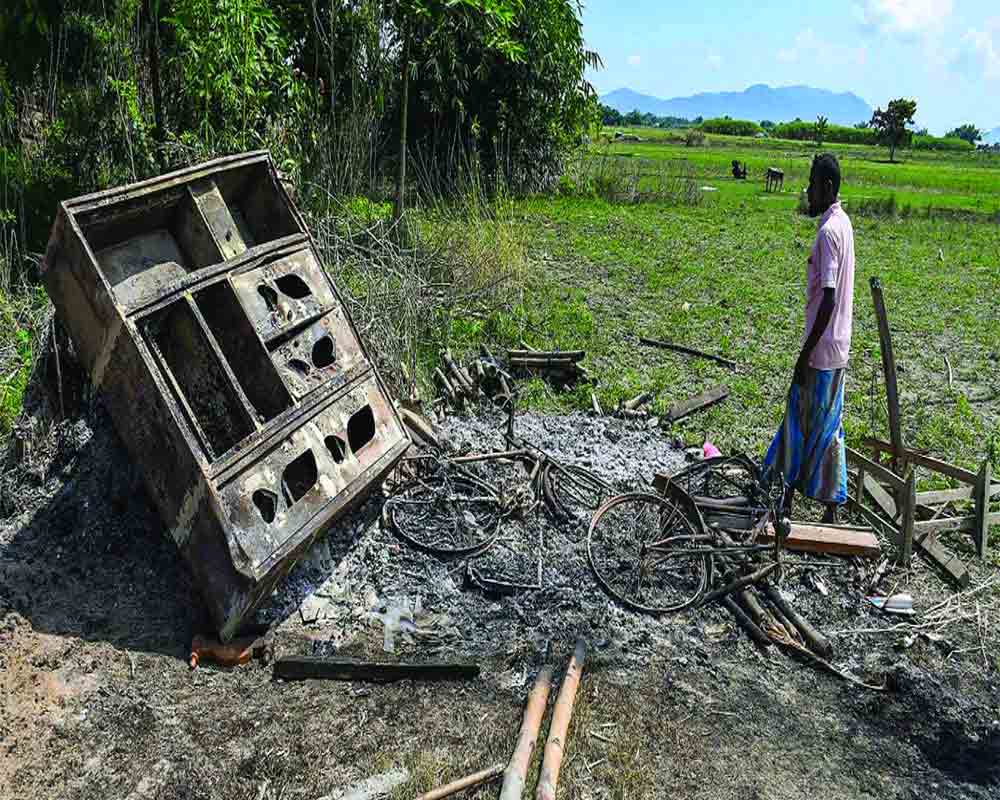The whole country is going through a weird moment. Not that violence is new to India, but it was never so blatant and cover-up so brazen
When the State acts with aggression against its people on spurious grounds, One can only expect danse Macabre. Only this time it was performed by Bijoy Shankar Bania, who stomped over the corpse of Moiniul Huq who had succumbed to the police gunshots. When hate has paralysed the minds and poisoned the thinking, anything is possible.
It is diabolical and sends chills down the spine. The stomper was a Government photographer. He accompanied the police team that went to evacuate the Government land in Dholpur village in Assam on September 23, 2021. He has been arrested and would be out as soon as jumping over a dead body is no big crime legally. Amorality is not punishable under the law. It is a hate crime at its best or worse. A professional psychologist would be better placed to understand the mind of a person who stomps over a dead body, religion of dead body notwithstanding. He had hatred for a community that made him do a dastardly act. It gives a peep into the mindset of the people now on the daily diet of communal hatred that has poisoned the minds of the people.
The Government of Assam was ostensibly dealing with a spin off of love jihad, land jihad with all its so-called good intentions. It acted with brute force but legally. Thanks to a nineteenth-century archaic law called ‘Assam Land and Revenue Regulation, 1886.’
Dhalpur was “grazing ground†on Government land. The “chars†had erected their shanties and were around for quite some time. Around 800 people have been evicted in the drive, whereas the real numbers could be around 20,000, if not more. The people evicted were served with notices a few hours before the eviction. The violence was a logical corollary in Assam’s Darrang district. However, the Government did not realise that it would come to such a pass. The police opened fire so much for the Government's will to solve the land issue with its “good intentionsâ€.
After winning the elections on a manifesto that promised illegal encroachments to be cleared, it was on the cards. Those addressed in the manifesto knew it would be Bengali Muslims, dubbed Bangladeshis in local parlance. The BJP harped upon its narrative of 'land jihad and consolidated its votes. The Bengali Muslims were portrayed as encroachers upon the land of the indigenous Assamese.
The Government wanted land for a farming project for locals called the “Garukhuti Projectâ€. The forceful eviction drive that led to resistance and firing. It killed Moinul Haque and the twelve-year-old child, Sheikh Farid, died on the altars of the Garukhuti project. The public good led to public misery. Though legally dressed it was naked oppression defying the basic premise of law.
In Assam, land is a far more emotional issue than elsewhere. Assam has been home to a multi-ethnic group which are often jostling for the land.
The marginalised communities are the worst sufferers in eviction drives. Be it eviction drives for beautification like 'Turkman Gate' in Delhi in the seventies or Kathputli colony rather recently or acquiring land for a project like in Bengal's Singur or Evicting forest land encroachers in Kerala or Niyamgiri in Odisha. The marginalised communities are touted as squatters standing in the way of development. It is conveniently forgotten that they too are citizens of India, who deserve to have the dignity of a small place to call their own
Assam Land and Revenue Regulation, 1886 gives the right to the commissioner to forcibly remove acquisitions but after due notice. This was not done. The Government could also have the option of going to court, though time taking, would have given a fair chance to the person. It was not used. The Government wanted to act and wanted to be seen as acting harshly.
Even if the persons were illegal squatters on Government land, the eviction must be done following the procedure established by law. This would need a fact-finding exercise to gauge whether a person is illegally encroaching upon the said land, or has a bona fide claim upon that land.
The Government followed a “summary eviction†procedure, under Rule 18 of the Settlement Rules made under the archaic ‘Assam Land and Revenue Regulation, 1886’. However, a person cannot be directed to vacate the land if they have a bona fide claim over the land. Rule 18 also mandates a publication of notice to provide the illegal encroacher with 15 days to vacate the land. This was again not done.
The stomping of the corpse was a ‘George Floyd’ moment for India but it passed rather calmly. That speaks volumes about sensitivities that we have as a nation. The whole country is going through a weird moment in history. Take, for instance, the incident at the Lakhimpur Kheri. Allegedly, the son of a Union Minister mauled the protesting farmers. Not that violence is new to India but it was never so blatant and cover-up so brazen.
The Opposition leaders were rounded up while the national media called people going there “political tourismâ€! Incredible as it may sound, the Opposition and voices of dissent are shrinking. The over-enthusiastic bird heads are getting out of control. The frankenstein planted in their heads is now manifesting in danse macabre.
(The writer is a columnist and documentary filmmaker. The views expressed are personal.)


























